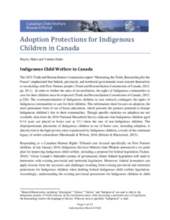Displaying 281 - 290 of 622
Esta nueva publicación del SSI sobre los fracasos de la adopción internacional tiene como objetivo acompañar y equipar a los profesionales de las Autoridades centrales y competentes y de los Organismos acreditados para la adopción, las personas adoptadas y los padres adoptivos, para prevenir mejor y manejar las crisis o los fracasos que las familias adoptivas pueden atravesar.
This Note from The Hague Conference on Private International Law aims to promote the proper interpretation and application of Article 2 of the Hague Convention of 29 May 1993 on Protection of Children and Co-operation in Respect of Intercountry Adoption (“1993 Hague Convention” or “Convention”).
This Plan presents key findings and 23 recommendations, sub-divided into short-term, medium-term and long-term actions, for an effective and efficient implementation of foster care, adoption and family support in Cambodia.
This information sheet outlines provincial adoption provisions for Indigenous children.
This new ISS publication on intercountry adoption breakdowns aims at giving support to adoptees, adoptive parents, professionals from Central Authorities and from other competent authorities, and Adoption Accredited Bodies, in order to prevent and manage the crises, and even breakdowns, faced by adoptive families.
This report presents the findings of a UK national Enquiry into the role of the social worker in adoption with a focus on ethics and human rights.
This Plan presents key findings and 23 recommendations, sub-divided into short-term, medium-term and long-term actions, for an effective and efficient implementation of foster care, adoption and family support in Cambodia.
This volume is an effort to highlight best practices for children without parental care.
This article explores Intercountry Adoption (ICA) practices and the related expansion of orphanages (also referred to as residential care) in the East African context.
This study uses data from the recent Modern Adoptive Families survey to understand parent perspectives on their preparation for adoption.








